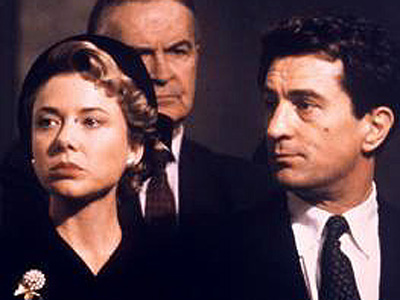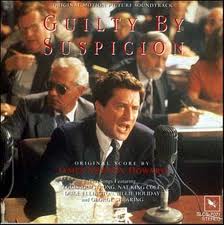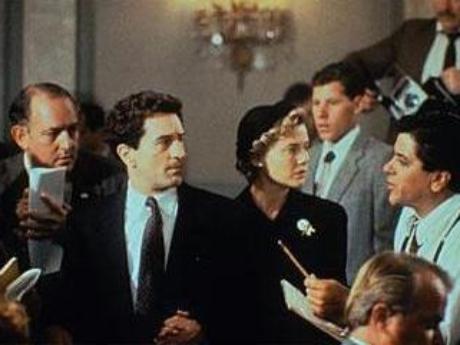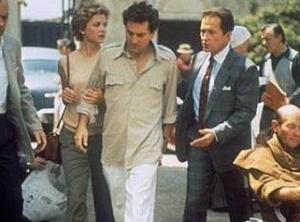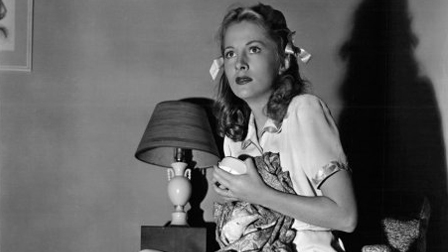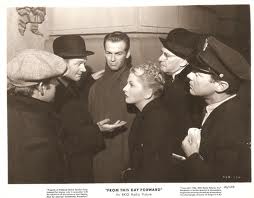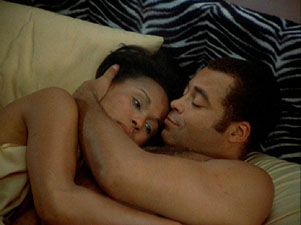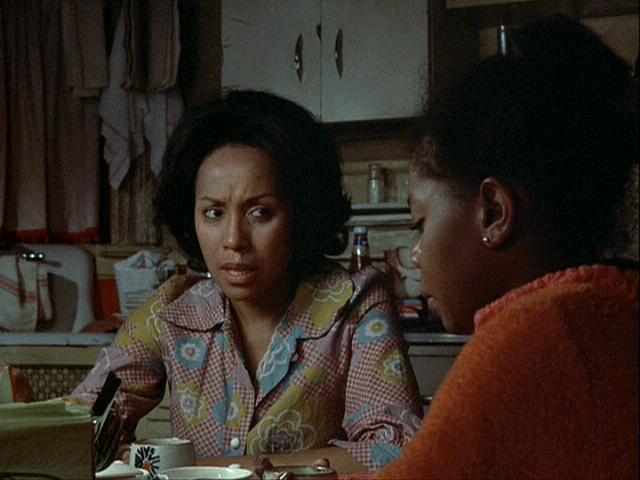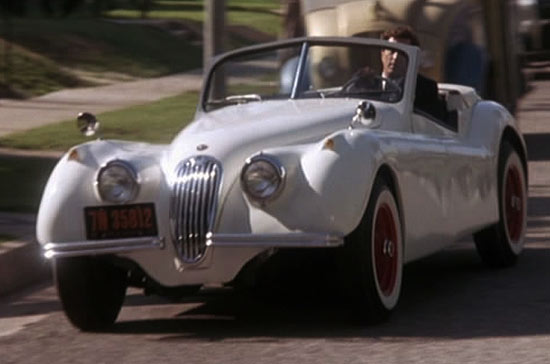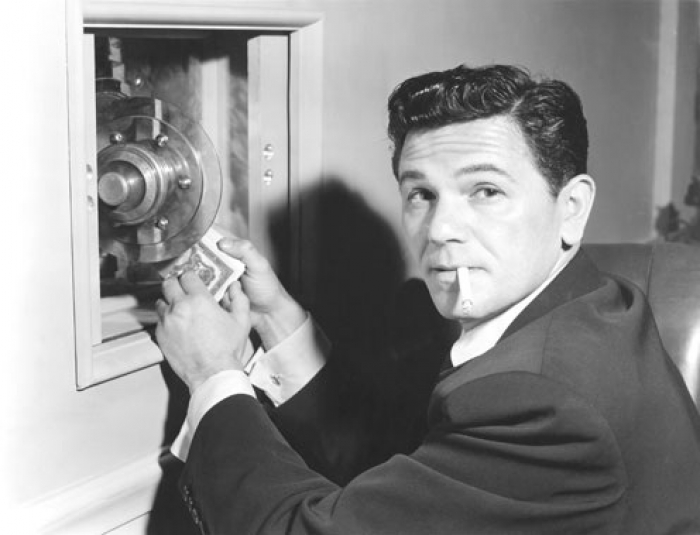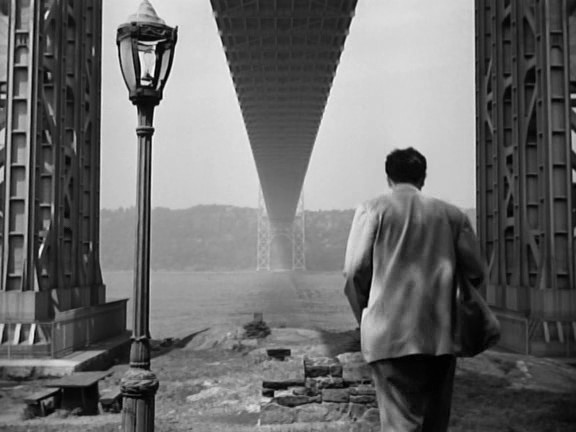From the Chicago Reader (March 22, 1991). — J.R.
GUILTY BY SUSPICION
*** (A must-see)
Directed and written by Irwin Winkler
With Robert De Niro, Annette Bening, George Wendt, Patricia Wettig, Sam Wanamaker, Barry Primus, Gailard Sartain, Chris Cooper, Ben Piazza, and Martin Scorsese.
There are plenty of bones one can pick with Guilty by Suspicion, the first Hollywood feature devoted in its entirety to the film-industry blacklist (The Front dealt with TV). Of course there are plenty of bones one can pick with just about any movie, if one is so inclined. But critics, at least, seem more inclined to be so inclined with movies that deal with political subjects. This is not to say that most critics reprove such movies on political grounds; on the contrary, they usually harp on other aspects. But one still winds up feeling that it’s frequently the politics that gets their hackles up.
Having seen this movie more than a week later than most of my colleagues, due to some interesting circumstances that I’ll discuss later, I’ve had ample opportunity to read and (more often) hear some of their carping, most of it hyperbolic invective about the acting and directing. Some of them have expressed so much antipathy for the picture that I went to the first screening at Webster Place last weekend expecting the worst. I emerged with some misgivings, but still I was deeply moved, and in a way that none of what I’d heard and read had led me to expect. Yes, the picture is flawed, but it is still something unusual in contemporary movies, a work that deserves to be called honorable, and not only in its intentions. Instead of coming out of the theater feeling that I’d been taken to the cleaners — a not uncommon feeling at a time when uncritical celebrations of the FBI like Mississippi Burning and The Silence of the Lambs are widely applauded as models of progressive thinking — I felt, on the contrary, that I had spent a couple of hours with a sensibility that is relatively humane, intelligent, and civilized — not brilliant or pyrotechnical, but still a sensibility that had something to say, knew how to say it, and hadn’t bored or insulted me in the process. And if audience vibes are anything to go by, I felt that many of those at the same screening experienced the same honesty and directness. (None of them, so far as I know, were critics.)
I do have my own objections to Guilty by Suspicion, and one of them is fundamental if not all- encompassing. But let me deal with my minor cavils first. While the handling of period (1951-52) decor, dress, and Hollywood social ambience seems fairly judicious, the characters’ speech — especially the slang they use — has more to do with the 70s or 80s than with the 50s. And when it comes to specific references to events, films, and directors of the period — some of them direct, some of them indirect — one has to grant the picture a certain license with the details. For example, when we see Ethel and Julius Rosenberg about to be executed, the year is 1952, not 1953 as it should be. In scenes set in 1951, Gentlemen Prefer Blondes (1953) and The Boy With Green Hair (1948) are both in production, and while the production date of High Noon is correct (1952), the movie is oddly converted into a Monogram quickie without star actors. Martin Scorsese plays a character clearly meant to suggest Joseph Losey (who directed The Boy With Green Hair), but he doesn’t seem very much like him. (A Broadway stage director named Abe Barron is clearly based on Abe Burrows; the character of Dorothy Nolan, played by Patricia Wettig, is derived from Dorothy Comingore, who played Kane’s second wife in Citizen Kane; Nolan’s husband Larry, played by Chris Cooper, seems a fusion of Comingore’s husband Richard Collins and actor Larry Parks.) Another oddity is the overall absence of Jews in this portrait of early 50s Hollywood; it will seem especially peculiar to anyone who believes that anti-Semitism played a role in the cold war hysteria that made the blacklist possible.
Although the writer-director, Irwin Winkler, is a distinguished and capable producer (his credits include Point Blank, Raging Bull, Round Midnight, and GoodFellas, as well as vehicles for Elvis Presley and Sylvester Stallone), his writing and directing skills don’t seem exceptional here; mainly they’re adequate, and at times — notably in the handling of Dorothy Nolan’s tragic fate — they are forced and strained. Winkler’s big failure, however, is a conceptual one. My major objection to Guilty by Suspicion is that it oversimplifies certain aspects of the Hollywood blacklist in order to tell a more legible and palatable story.
The project started out as a film to be produced by Winkler, scripted by Abraham Polonsky (one of the most talented victims of the blacklist), and directed by Bertrand Tavernier. The key inspiration for the story was the figure of John Berry, a blacklisted American director who, like many others — Cyril Endfield, Joseph Losey, and Jules Dassin are the first three who come to mind — was forced to emigrate to Europe in order to continue working. As the project developed, Berry — who is still directing abroad today, and who I had the pleasure of meeting at the Rotterdam film festival six weeks ago during a retrospective of his work — remained the principal model, but Tavernier dropped out when the decision was made to set the story in the U.S. rather than France. Polonsky remained as a major source of information about the blacklist, but he too eventually departed because he disagreed with Winkler’s approach to the story.
According to a recent article in the Los Angeles Times, “Polonsky completed a screenplay about an American Communist who succeeded in holding onto his political beliefs but ultimately was forced into exile in France.” The same article reports that Polonsky not only withdrew his name from Winkler’s script, but also refused an executive producer credit on the film, even though it would have paid him a handsome fee. The hero of Winkler’s film, David Merrill (Robert De Niro), is basically a liberal who attended two or three Communist meetings during the Depression (until he was thrown out of one for his opinions), but is not especially political otherwise, at least until the House Committee on Un-American Activities forces him into a political position by asking him to inform on his friends. He’s a victim of the blacklist mainly because he wants to go on practicing his profession but refuses to give names to the committee. One isn’t made to feel that he has a political voice that the committee has silenced; his voice is simply the voice of decency, suggesting Joseph Welch at the Army-McCarthy hearings — a parallel that is drawn overtly through a couple of the lines Merrill speaks at his own hearing, the last and most effective scene in the film.
It’s certainly true that a good many Hollywood careers were destroyed in just this fashion, brutally and arbitrarily, because certain liberals refused to squeal on their friends. (Many more people, who agreed to give names, went back to work and often flourished: three well-known examples are director Elia Kazan, screenwriter Budd Schulberg, and actor Lee J. Cobb, all of whom worked on On the Waterfront in 1954 — a film that not coincidentally extols the virtues of ratting on one’s friends.) It’s also true that the received wisdom about this era is that most of the blacklist victims weren’t especially political.
But some recent research by two resourceful film scholars and filmmakers, Thom Andersen and Noel Burch (who are planning a film on the subject), suggests that although many interesting books have been written about the blacklist, the political content of preblacklist films by subsequently blacklisted Hollywood professionals hasn’t really been considered in depth at all. Andersen and Burch have cogently argued, for that matter, that such remarkable and neglected films as Endfield’s Try and Get Me! (1951), Losey’s The Prowler (1951), Berry’s From This Day Forward (1946), and Dassin’s Thieves’ Highway (1949) — to cite only a few of their many examples — offer radical critiques of American life, not namby-pamby liberal bromides. This suggests, in other words, that the blacklist and the McCarthy witch-hunts of the same period were evil not only because they indiscriminately destroyed individuals who refused to betray their friends, liberals as well as radicals, but also because they constituted a highly effective form of ideological warfare.
How effective was this warfare? Effective enough, I would argue — given the thousands of individuals who lost their friends, their livelihoods, or both — to demoralize the “old left” so thoroughly that it never fully recovered from the experience; effective enough, in this regard, to make truly leftist filmmaking in Hollywood seem highly suspect ever since (neither Endfield nor Berry is mentioned once, even in passing, in such books as The American Cinema, Kings of the Bs, or The Hollywood Social Problem Film); effective enough not only to make Guilty by Suspicion circumspect (and therefore highly compromised) about such matters, but also to make some critics uneasy about the movie even in its compromised, nonconfrontational form.
The cautiousness of Winkler’s script centers on the hero’s sense of vocation: David Merrill, a highly respected director who simply wants to work, is an artist largely because he isn’t much concerned with politics; as the film takes great pains to show us, plotting out storyboards is his business, not thinking about the way people live. Yet it was clear from the hours I spent with John Berry in Rotterdam that what mattered and still matters to him about his own best pictures, such as From This Day Forward and Claudine (the latter his first postblacklist American feature, released in 1974) — both of which he saw at the festival for the first time since they were released — is the knowledge, feeling, and insight they impart about what it means to be poor in a big city.
Both movies are concerned specifically with the bureaucratic obstacles that poor people face — From This Day Forward focuses on the postwar adjustments of a struggling white couple on the job market (Joan Fontaine and Mark Stevens), while Claudine concerns the comic struggles of a black couple (welfare mother Diahann Carroll and garbageman James Earl Jones) with the welfare system. And Berry’s mise en scene is wholly a function of his understanding of what his characters are up against, not his capacity to draft pretty pictures a la Hitchcock on a sketch pad. Originally a theater person (he began as a member of Orson Welles’s Mercury Theatre in the 30s), Berry, like Polonsky and John Garfield, is a specifically urban type whose talent is virtually indistinguishable from his street smarts; in Guilty by Suspicion, De Niro’s David Merrill may sport a Garfield haircut, but he barrels around Hollywood in a snazzy white convertible, and we’re asked to believe that one of his biggest personal tragedies is having to part with that car.
At most the film implies that the Hollywood blacklist may have stifled social criticism, but it doesn’t really show us any social criticism being stifled, and it doesn’t quite argue that social critics — assuming that any existed — were innocent either (although, according to the Bill of Rights, they were). In fact, when push comes to shove, the movie doesn’t deal with the question of social criticism at all, except to indict the blacklist as an insane, destructive force (which it was). Emotionally speaking, the attention that might have been paid to the political thinking of Merrill is supplanted by his relationships with his ten-year-old son (Luke Edwards) and his estranged wife (Annette Bening), and these relationships are shown to be essentially devoid of political associations as well.
The closest the film comes to showing the effect of cold war hysteria on Merrill’s son is a sequence when he is watching a TV report on the soon-to-be-executed Julius and Ethel Rosenberg, including their two soon-to-be-orphaned sons; this leads the boy to ask his father fearfully if he’s about to be killed as well. As it happens, I was ten myself that summer, and I recall seeing the headline “ROSENBERGS EXECUTED” on a family trip to Washington, D.C.; struck by the resemblance of “Rosenberg” to “Rosenbaum,” and upset to the point of tears about the two little boys who’d just lost their parents, I plied my own liberal father with troubled questions. Two months later, however, in a Times Square arcade, I was about to have a fake newspaper headline made up bearing my name, and asked my father for a suggestion. He proposed “JONNY ROSENBAUM CAPTURES RED SPIES!” It seemed like a wonderful idea at the time, and I still have the newspaper to prove it. So the same Jonny Rosenbaum who wept for the Rosenberg boys in June was quite delighted with the fantasy of capturing their parents single-handedly in August: it was part of the everyday insanity of that period, roughly comparable to the wild standing ovation George Bush recently got in Congress (from adults, I should add) when he declared that this country has the strongest economy in the world. It seems to me, in other words, that Guilty by Suspicion falters by localizing its subject in a few easy targets — restricting the insanity of America in the early 50s to a few FBI agents, HUAC hearings, and frightened studio executives, without admitting that the fantasies of the period seeped much deeper than that into the everyday and unexceptional textures of American life.
Having said this much, I still value Guilty by Suspicion highly for broaching and dramatizing other major aspects of the blacklist. As one critic friend has rightly pointed out, the film is slightly marred by a disturbing double standard: it comes close to exonerating the studio head Darryl F. Zanuck (played here by Ben Piazza) because he acknowledges the odiousness of the witch-hunts as he goes along with them, while at the same time it castigates a fictional small-time producer (played by real-life producer Gene Kirkwood) for bending to the same pressures. Still, it gives us some notion of how fully producers at opposite ends of the economic scale were implicated in the same diabolical process, and for this and other vivid details it deserves to be congratulated.
Perhaps the most painful and demoralizing single moment in the film occurs when Merrill’s best friend, a screenwriter named Bunny Baxter, is asked to name names himself, and asks Merrill if he can include his name: “Please, please,” he asks his friend in tears. “What’s the difference? You’re dead already.” The sharp intakes of breath and cries of pain I heard all around me in the audience told me that, at least on a personal and emotional level, the true debasement and horror of the blacklist had somehow registered.
How can we account for the fact that so many principled people caved in to HUAC? Perhaps one could argue that Winkler’s main interest is telling us not what it meant to be blacklisted but what it felt like. If that was his intention, I think he succeeded pretty well — something that I can say with some pretense of authority, because I’ve recently had my very own experience of being blacklisted, or at least blackballed, albeit in a very minor way. Curiously enough, this experience came from the Chicago office of Warner Brothers, the film company that’s distributing Guilty by Suspicion.
A few weeks ago, a film-critic friend called to reschedule a lunch date because he wanted to attend a screening of New Jack City that had just been set up by Warner. I hadn’t been invited to the screening, and when I expressed interest in it my friend suggested I call Warner’s local publicity man, but asked me not to reveal who had told me about the screening. The publicist, a Warner employee since the late 50s who previously worked for the FBI (I’m told that he began his association with the company by working on The FBI Story [1959] in some advisory capacity) is known among Chicago film critics for his eccentric manner in handling press screenings. (To cite only one instance, Chicago is probably the only major city in the U.S. where Bird didn’t have a press show; a few critics were admitted at the last minute to a special screening sponsored by the Film Center, but I had to drive out to the suburbs after the film opened in order to see it properly in stereo.)
When I called the Warner publicist was out, so I asked his assistant if I could attend, and she didn’t imagine there would be any problem. About an hour later my phone rang, and when I picked it up the publicist began screaming at me and demanding to know who had told me about the New Jack City screening. I said I didn’t remember, and when he persisted in badgering me I came up with the name of one of the most prominent local critics — not the one who had told me, but one who I thought was least likely to be hurt by being named. “You’re lying!” the publicist screamed, and went on to explain why he knew I was lying before hanging up on me. A few minutes later he rang up again and screamed at me some more. I told him that I had only called in the first place to ask if I could attend the screening, and if he didn’t want me to come, I wouldn’t. He said he didn’t want me to and hung up again; I was subsequently removed from the Warner press-show list, which is why I didn’t make it to the advance screening of Guilty by Suspicion.
One thing this experience taught me was that, no matter how principled one may claim or aspire to be, when push comes to shove it’s easy to find oneself in the demoralizing position of grasping for straws, even in a situation as relatively trivial as this one. I may not have buckled by supplying the publicist with the name he was demanding, but I certainly didn’t behave heroically. Faced with the danger not of losing my livelihood but merely of losing my access to Warner press screenings (which I wound up losing anyway), I didn’t defy my interrogator by refusing to answer — as David Merrill and several real-life film people did — but lied instead, not once but twice.
By alluding to the publicist’s former association with the FBI, I merely want to suggest the aggressiveness of his manner; I don’t want to employ any McCarthyite tactics myself by implying through this that he was involved in the Hollywood blacklist. (Warner Brothers as a studio had a pretty terrible blacklist record, but it would be hypocritical and unethical to assign any guilt by suspicion in this regard.) I should also acknowledge that this individual’s behavior is aberrant rather than typical in this day and age; but such behavior was equally aberrant before the blacklist took hold, and I can now easily imagine how unexpected the initial interrogations must have been for the first people who were called up. (Garfield was one of these, and while he refused to give names, he didn’t live long afterward. Polonsky, who featured Garfield in his 1948 masterpiece Force of Evil, put it succinctly: “He defended his streetboy’s honor and they killed him for it.”)
Perhaps the worst aspect of the blacklist was its eventual capacity to turn such aberrance into the norm, an everyday part of life, thereby creating a climate that we’re still recovering from in some ways. The fact that Guilty by Suspicion has been made at all shows to what extent we’ve recovered; the fact that it leaves so much of the story still untold shows to what extent we haven’t.

